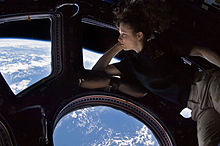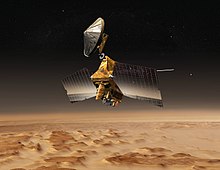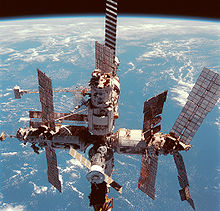Wikipedia:Wikipedia Signpost/2011-02-07/WikiProject report
Stargazing aboard WikiProject Spaceflight





This week, we turn our attention to WikiProject Spaceflight. Started in September 2006 by Mlm42, it has 40 active members. The project is home to 12 Featured articles, 5 Featured lists, 22 Good articles, and a portal – with a total of 5,258 articles under its care.
The Signpost interviewed five project members, and started by asking what motivated them to join the project. It is clear that all members have a passion for topics related to space. Colds7ream and Mlm42 were both drawn to spaceflight articles because of STS-115 during 2006, then under WikiProject Space missions. Mlm42 was inspired by banners like {{WPMILHIST}}, and was keen to jump on the 1.0 Article Assessment bandwagon, hoping to create a project banner that could track spaceflight articles. There was a discussion in 2007 to reorganize all space-related WikiProjects under a "WikiProject Space", and in 2008, WikiProject Space missions and WikiProject Space travelers were merged into WikiProject Human spaceflight as part of an effort to increase editor activity. A couple of years later, Mlm42 decided to bring Expedition 1 up to GA-status, in time for its 10 year anniversary in August 2010. Following a further discussion, it came to light that WikiProject Astronomy was not using, and had no desire to use, the "WikiProject Space" banner that had been created in 2007. So, it was decided to dissolve WikiProject Space completely, and simultaneously merge everything under Spaceflight into one project. GW was actively editing in this area prior to joining the project, and became a member when its scope was expanded from exploration-related articles to everything to do with spaceflight. He is active in both content and organizational areas of the project, and has been involved with most of the reorganization of space projects over the last four years. ChiZeroOne realised that collaboration with other editors is a means to improvement, and has been helping in any way possible with the revival of WikiProject Spaceflight. N2e has been editing space-related articles since 2004, and is particularly interested in private space ventures, such as the recent new competition for the national-monopoly governmental space initiatives of the early decades of the space age.
WikiProject Spaceflight has 5,258 articles associated with it. How do you keep all these up and what are your biggest challenges?
- Colds7ream: I suppose we really have two major challenges with our articles. The first is a major problem with recentism; ongoing spaceflights receive much more attention than past missions despite the fact that they may be less important historically. A perfect case in point is to compare the articles for STS-115 (which at one point had an extra article dedicated to the mission's timeline) and STS-107, or Salyut 1 and International Space Station. We could really do with a few more historians to help out and fill in the gaps we have in spaceflights' past. The other problem we have is a fairly Western bias; missions conducted by the former Soviet Union or Russia seem to receive much less activity than US missions, the prime examples here can be seen by comparing articles to do with space shuttle missions and those regarding Soyuz flights, and the expeditions they delivered. Some help here, particularly as more new sources of information are published, would be greatly appreciated.
- GW: There are a lot of articles, and it is hard for a small group of editors to keep up with it all, as I think the project's cleanup listing reveals. That said, this is an issue faced by many projects. I agree with Colds7ream that systemic bias is a big problem. I am not sure if this is an issue of demographics, or simply that there are more English-language information about US space programs than other countries. Another issue is that when the mainstream media covers spaceflight, their articles tend to be oversimplified and in some cases poorly researched, which often leads to problems like Buran being included in the list of space shuttle missions because the media seem to consider all space planes to be "space shuttles", as well as more generic issues such as confusion between mass and weight.
- ChiZeroOne: I should probably point out that a good 700 or so of those are fortunately non article-space, like templates or files – useful content in supporting editing. These only require the odd bit of maintenance so it's not as bad as it looks. A problem that had affected the old project was organization, or rather lack of it. With the aid of a number of bot-maintained tools we use, as well as our efforts at collaboration, we are starting to get a hand of the situation. For example, with timely restart of Article Alerts we can now keep a greater track of issues important to the project. As for the Western (particularly US) bias in our articles, the reality is that NASA is a large source of public domain information whereas elsewhere, free-use material is harder to come by. There's also the language barrier, which technical subjects seem to suffer from.
- N2e: There's really no way to keep up with over 4,000 articles in an emergent phenomena of spaceflight-related written knowledge. Rather, as with most editors, I just work at the margin to make some small difference that helps vector change in a positive direction.
Do you collaborate with other WikiProjects?
- Colds7ream: At the moment, not really. The main collaborations the project had in the past were with the projects it absorbed. We would, however, very much like to set up some associations with other WikiProjects, for instance the Aerospace biography task force of WP:AVIATION for our astronaut biographies and WikiProject Rocketry for launch vehicles. Plus, we also still maintain a cordial relationships with astronomy-related WikiProjects that we'd like to make more of in the future. Of course, if there are any other projects out there that would like to get involved in a collaboration with us, we'd love to hear from them!
- GW: I think we have yet to address the issue of how collaboration should be achieved and how the projects should interact. I think there is a lot of common ground with some of the aviation WikiProjects; the Military History, Rocketry, Astronomy and Solar System WikiProjects. There was recently some talk of a joint task force with Astronomy and Solar System, however, nothing seems to have come of it.
WikiProject Spaceflight has Task Forces as well as Working Groups. What are the differences between the two?
- Colds7ream: They can pretty much be thought of as an experiment in collaboration. The Task Forces are what remains of WikiProject Human spaceflight and WikiProject Unmanned spaceflight, and their model is to operate a large editor base responsible for a range of articles with general aims. The Working Groups on the other hand, we see as task-dependent. Their model is to take a small group of editors and a small group of articles, and carry out a specific task.
- GW: When this structure was decided upon, the Task Forces were intended to look after large numbers of articles, taking care of general tasks and breaking the project's content into more manageable sections, as well as maintaining a structure similar to what had existed prior to the reorganization. In practice, the project has become more centralized than expected, so maybe this element of the structure needs to be reviewed. The Working Groups are intended to be small groups of editors collaborating on an area of common interest, and in some cases with a particular goal or end result. We currently have two such groups with very different aims. The Timeline of Spaceflight Group is attempting to produce a comprehensive timeline of spaceflight, listing every spaceflight since 1943, while the Space Stations Working Group works to develop a series of Featured topics on space stations. The working groups are intended to be ad-hoc collaborations, which can be created for any purpose as long as several editors want to collaborate in that area.
What are the most pressing needs for WikiProject Spaceflight, and how can a new contributor help?
- Colds7ream: What we'd really like to achieve in the near future are some more Good articles or Featured topics, with our current focus being on space stations. We think that having such featured content would give the project some good press and attract some new editors to join, which is always a good thing. In a similar vein, we'd really like to get Portal:Spaceflight up to Featured portal status for the same reasons. So, if anyone out there is good with topics or portals, we'd be very much appreciative of their help.
- Mlm42: If an editor wants to start small, they could try chipping away at the Spaceflight cleanup listing, where about half of all spaceflight articles are tagged with some kind of problem. I've found this tool useful, because it groups together articles that have similar problems.
- GW: I agree with Colds7ream and Mlm. Increasing the levels of Featured content, particularly Featured topics, is a priority, and we do have quite a backlog of cleanup tasks. Aside from that, there are a lot of articles which have not yet been created, and many more which could benefit from a great deal of expansion. A multilingual contributor could also help by expanding articles with information from non-English sources, which may help to eliminate some of the systemic bias.
- N2e: I would add that a new editor with a history focus could join us to look at the many articles that document older/past missions and projects but are poorly referenced, and thus may not stand the Wikipedia sands of time, where unverified material will, quite naturally, be gradually culled out.
Any final words?
- Colds7ream: We'd love to point out to the community at large the benefits of merging small, inactive projects into larger editor groups. Before the big WikiProject Space reorganization in December 2010, there were five spaceflight-related WikiProjects, each with small editor bases and largely inactive. By merging these projects together, we've re-energized the editor base and got much more of a community spirit going, which we hope will be able to achieve better things than the split projects could. We'd urge small projects to get in contact with related projects and consider merges, and reiterate to editors starting new projects to first join an already-existing one to see if that project can help, rather than splitting up editors. For instance, during the reorganization, we "discovered" a WikiProject Eclipses, which had one member and was completely unknown to any other editors who might have been interested.
Next week, we'll see the genesis of new articles authored by anonymous users. Until then, read all the articles created by Signpost regulars in the archive.


Discuss this story
WP:NASCAR should get a redo. Our story was horrible compared with half of these. Nascar1996 01:16, 8 February 2011 (UTC)[reply]